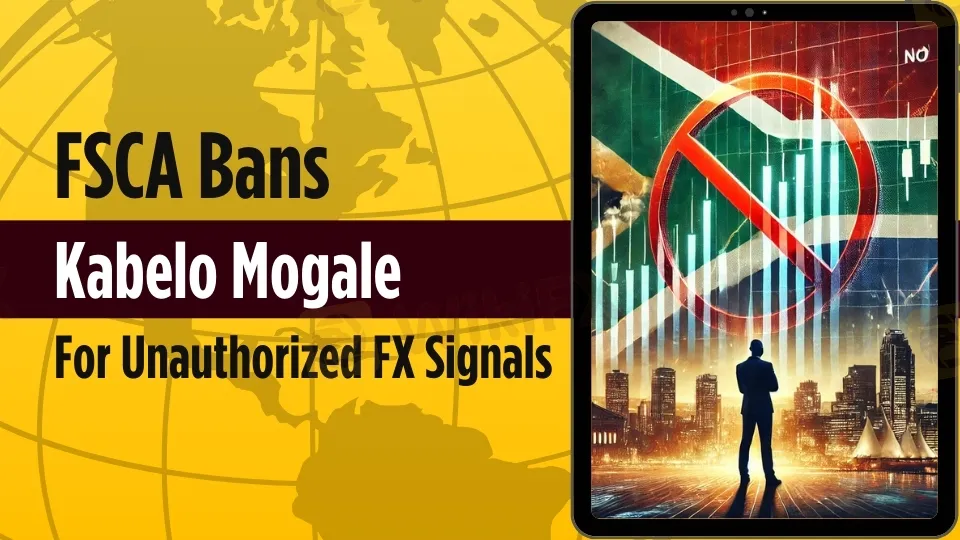简体中文
繁體中文
English
Pусский
日本語
ภาษาไทย
Tiếng Việt
Bahasa Indonesia
Español
हिन्दी
Filippiiniläinen
Français
Deutsch
Português
Türkçe
한국어
العربية
FSCA Bans Kabelo Mogale for Unauthorized FX Signals
Abstract:FSCA bans Kabelo Mogale for 10 years and fines him R1M for offering illegal forex signals without a license, warning others of the risks of unlicensed services.

South Africas Financial Sector Conduct Authority (FSCA) has taken strong action against Kabelo Emanuel Mogale. He has been banned for 10 years and fined R1,015,315.87 ($54,827) for offering unauthorized forex signals. Mogale, who operated as “Forex Private Jet Injectors,” was found guilty of not having a valid financial services license.
FSCA Investigation Reveals Violations
An FSCA investigation discovered that Mogale was providing forex tips and financial advice via Telegram without the required license. This violated the Financial Advisory and Intermediary Services Act (FAIS Act), which requires anyone offering financial services to be licensed.
The FSCA determined that Mogales advice on forex trades counted as financial services. His refusal to cooperate with the investigation made the situation worse, resulting in more violations under Section 139(2) of the Financial Sector Regulation Act of 2017.
The Risks of Unlicensed Financial Services
Providing forex signals or financial advice without a license is illegal in South Africa. The FSCA warned that unauthorized signals not only break the law but also put investors at serious risk. Mogales penalty serves as a warning to others engaged in similar illegal practices.
Forex signal providers who charge fees or take a percentage of profits must be licensed to operate in South Africa. Without a Financial Services Provider (FSP) license, they face criminal charges under South African law.
FSCAs Role in Regulating Forex Trading
The FSCA is responsible for regulating forex trading in South Africa. It ensures that forex brokers and signal providers follow the countrys financial laws. The FSCA issues licenses to those who comply with the Financial Markets Act (FMA) of 2016 and punishes those who break the rules.
Recently, the FSCA has increased its efforts to enforce regulations, especially among unlicensed Financial Services Providers (FSPs). On March 28, 2024, the FSCA issued a warning to 14 unlicensed FSPs offering derivative trading options. This move highlights the dangers of unregulated financial services and the FSCAs mission to protect investors.
Conclusion
The FSCAs ban on Kabelo Mogale for offering unauthorized forex signals sends a clear message to the financial sector. Complying with the FAIS Act and obtaining the correct licenses is non-negotiable for anyone providing financial services in South Africa. Investors must be vigilant and verify the credentials of service providers before making any financial commitments. The FSCA continues to regulate the forex market, ensuring it remains transparent, safe, and fair for everyone involved.
Stay informed on the latest in forex regulation! Read more about FSCAs action against Kabelo Mogale on WikiFX News.

Disclaimer:
The views in this article only represent the author's personal views, and do not constitute investment advice on this platform. This platform does not guarantee the accuracy, completeness and timeliness of the information in the article, and will not be liable for any loss caused by the use of or reliance on the information in the article.
Read more

The Hidden Checklist: Five Unconventional Steps to Vet Your Broker
Forex broker scams continue to evolve, employing new tactics to appear credible and mislead unsuspecting traders. Identifying these fraudulent schemes requires vigilance and strategies beyond the usual advice. Here are five effective methods to help traders assess the legitimacy of a forex broker and avoid potential pitfalls.

Doo Financial Obtains Licenses in BVI and Cayman Islands
Doo Financial, a subsidiary of Singapore-based Doo Group, has expanded its regulatory footprint by securing new offshore licenses from the British Virgin Islands Financial Services Commission (BVI FSC) and the Cayman Islands Monetary Authority (CIMA).

CFI’s New Initiative Aims to Promote Transparency in Trading
A new programme has been launched by CFI to address the growing need for transparency and awareness in online trading. Named “Trading Transparency+: Empowering Awareness and Clarity in Trading,” the initiative seeks to combat misinformation and equip individuals with resources to evaluate whether trading aligns with their financial goals and circumstances.

Malaysian-Thai Fraud Syndicate Dismantled, Millions in Losses Reported
The Royal Malaysia Police (PDRM) has received 26 reports concerning the Nicshare and CommonApps investment schemes, both linked to a major fraudulent syndicate led by a Malaysian citizen. The syndicate’s activities came to light following the arrest of its leader by Thai authorities on 16 December.
WikiFX Broker
Latest News
ASIC Sues Binance Australia Derivatives for Misclassifying Retail Clients
Top 10 Trading Indicators Every Forex Trader Should Know
WikiFX Review: Is FxPro Reliable?
Malaysian-Thai Fraud Syndicate Dismantled, Millions in Losses Reported
Trading frauds topped the list of scams in India- Report Reveals
AIMS Broker Review
The Hidden Checklist: Five Unconventional Steps to Vet Your Broker
YAMARKETS' Jingle Bells Christmas Offer!
WikiFX Review: Something You Need to Know About Markets4you
Revolut Leads UK Neobanks in the Digital Banking Revolution
Currency Calculator


